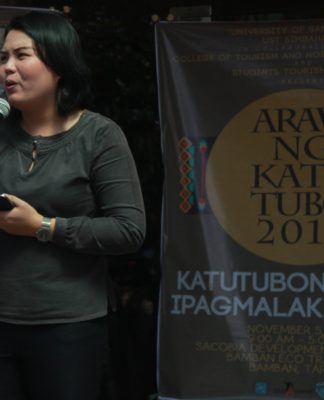A NOBEL prize winner opened the UST’s Global Conference on Ethics in Science and Technology at the Thomas Aquinas Research Complex last month, explaining that truth should not be pursued for truth’s sake without considering the ethical implications.
Professor Yuan Tseh Lee, who won the Nobel prize for chemistry in 1986, said “scientists have a responsibility for the consequences of their actions,” stressing the importance of ethics in the scientific profession as a means to have “social responsibilities.”
“Competition and individual development must not be prioritized,” Lee said in his keynote speech, which was delivered before scientists, engineers, and ethicists from around 20 countries. “If we are to avoid catastrophe and ensure humanity’s continuation on this planet, the keyword for the next few decades will be transformation.”
Ethics in various fields of science—cyberethics in information technology, bioethics in genomics, nanoethics, a scientific code of conduct, and ethics in climate change—were also discussed in the conference from Oct. 20 to 22.
Professors Johan Hatting of the Stellenbosch University in South Africa and Clive Hamilton of Charles Sturt University in Australia discussed the ethics of climate change, while ethical and social impacts of nanotechnology were addressed by professors Joachim Schummer of Karlsruhe University in Germany and John Weckert of Charles Sturt University.
“Greenhouse gas emissions must be cut by rich countries to maintain the economic distinction between ‘survival emissions’ and ‘luxury emissions.’ Wasteful consumption of natural resources is not justifiable,” Hamilton said.
Schummer said “nanotechnology has made technology faster and issues on its use must be managed to minimize risks from nanoparticles.”
Nanotechnology makes products more efficient and durable, but its risks must not be overlooked, he added.
“Scientists have a moral duty to care for those affected by their work,” Weckert said, adding that research plays a vital role in helping mankind discover new technology, develop new products, and improve human lives.
Publication and information ethics on research were discussed by Elizabeth Wager of the Committee on Publication Ethics in the United Kingdom, and professors Cameron Richards of University Teknologi Malaysia and Syun Tutiya of Japan’s National Institution for Academic Degrees and University Evaluation.
“Research must be reliable and the findings must not cause harm,” Wager said, adding that published works must be dependable and have integrity.
Richards, meanwhile, said “sustainability, innovation, and social relevance must be a rationale of scientific research.”
Tutiya of the National Institution for Academic Degrees and University Evaluation in Japan said ethics concerns the values involved in human communication, “without which humans are no longer humans.”
“The same technology connects the world and forms the way we live uniformly in the world,” said Tutiya.
Teaching ethics to Science and Engineering students was discussed by Tom Borsen of Aalborg University in Denmark and Guido Van Steendam of the Catholic University of Leuven in Belgium, while media and communication ethics were discussed by Msgr. Paul Tighe of the Pontifical Council for Social Communication.
Borsen said a scientist is socially responsible if the wider consequences of their actions are coherent with their own personal ethical orientation system.”
“To behave socially responsibly, a scientist needs an ethical orientation system,” Borsen said.
Van Steendam, on the other hand, likewise said scientists should learn the responsibility of truth, adding that “technologically okay” is not enough, but it should also be “socially okay.”
“Not everything should be done just because it’s possible,” he said.
Tighe, meanwhile, said one core commitment for all professionals is the nature of truth, adding that ethics is intrinsic to a profession.
Fr. Norbero Castillo, O.P., dean of the Faculty of Philosophy, said in his closing remarks that ethics is about choices and decisions, and that respect, dignity, and loyalty are the foundation of ethical principles of humans.
The conference organized by the Graduate School and the Faculty of Philosophy acquired support from the Association of Southeast Asian Nations Foundation United Nations Educational, Scientific, and Cultural Organization National Commission of the Philippines, and the Philippine Council for Industry and Energy and Research and Development–Department of Science and Technology. F. E. M. P. Flores and Lorenzo Luigi T. Gayya

















